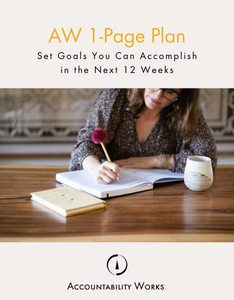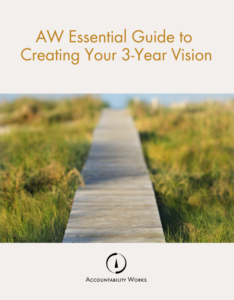When Marissa and I were doing our first round of visioning and business planning as partners we did a deep dive into our WHY. Why does Accountability Works exist? Then asking, why do we want to do this work? As partners and individually. And so on. It was insightful and we landed on a central theme of regret. For me it was captured in the line from Mary Oliver’s poem Summer Day. Tell me, what is it you plan to do with your one wild and precious life? And for Marissa it was an awareness of the feeling of regret and wanting to live with as little of it as possible.

Often when people come to work with us, it is because there is something that has been on their minds to start, change, or finish that has been with them for quite some time. The pain of not doing or not doing fast enough has gotten so big that they are ready to commit and support that commitment with accountability. That jives perfectly when it comes to regret. It seems in study after study that we regret most the things we did not do over the things we did do. We have a knowing that if we do not take action on this thing, whatever it may be, we will regret it, and that becomes a motivator. So for many, including us, regret is a powerful motivator and worth taking a deeper dive into.
I’m glad I ended up reading Daniel Pink’s book, The Power of Regret: How Looking Backward Moves Us Forward, because he has done some remarkable work on the subject and does a great job of breaking down the research he and others have done.
According to Pink, nearly all regrets fall into four categories:
1. Foundation regrets
These are things that we failed to do because they seemed unimportant in the moment but over time would have a huge impact. Things like saving or taking care of our health. I was particularly tickled by the use of the word foundation because in our program we use personal foundation for just these sorts of actions. These are the habits that don’t necessarily add up to a goal but build up over time and create the foundation for all the other things you want to accomplish.
2. Boldness regrets
These are the regrets that stem from not being true to yourself. They are regrets of inaction. When I was listening to this section in Pink’s book I kept thinking about our vision process. The purpose of our vision process is to declare what you really want so that when you set goals, they are in alignment with what you want most in your life. It reinforced for me the power of that process. We always use the word brave, your bravest vision. Now I’m thinking we should update that to boldest because boldness contains bravery but it also connotes the willingness to take risks, which is what these regrets are all about.
3. Moral regrets
These are the regrets where we didn’t do what we thought was right. It’s trickier to come up with a moral standard but the idea is that you didn’t act in alignment with your own moral compass and that is where the regret lies. A point that came up with all regrets is that they tell you what your values are.
4. Connection regrets
These are the regrets that you have about lost, missed or broken connections. Here Pink cited the Harvard Study on Adult Development and made the assertion that tending to your relationships was a form of self-care. I became curious about this and so I dug into it and came across this TED Talk from its current director, Robert Waldinger. In it he states that the clearest outcome of the 75-year study is that good relationships keep us happier and healthier. And predictive of good health. The people that were the most satisfied in their relationships in middle age were the healthiest in their old age.
After learning more about regret, I’m convinced it is a powerful motivator. Since we aren’t going to be able to live without regret at least we learn from it. Pink’s book had several suggestions on just how. You can make a list of our regrets and look for a pattern. Take action on your regrets of inaction. You can look at your moral regrets and learn more about your values. Reviewing your connection regrets can move you to mend broken fences or where that’s not possible, reframe your regret so you don’t repeat your mistakes in future relationships. Having done some of Pink’s suggestions myself, I’ll be updating our Year in Review for 2023 to add some questions around regret. Regret might not feel good but it definitely has a lot to teach us, can help us make better decisions and take action.



